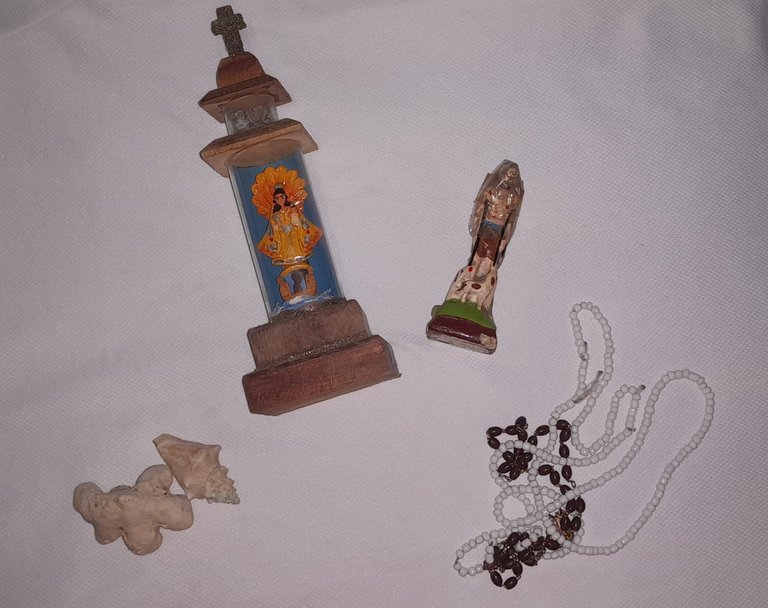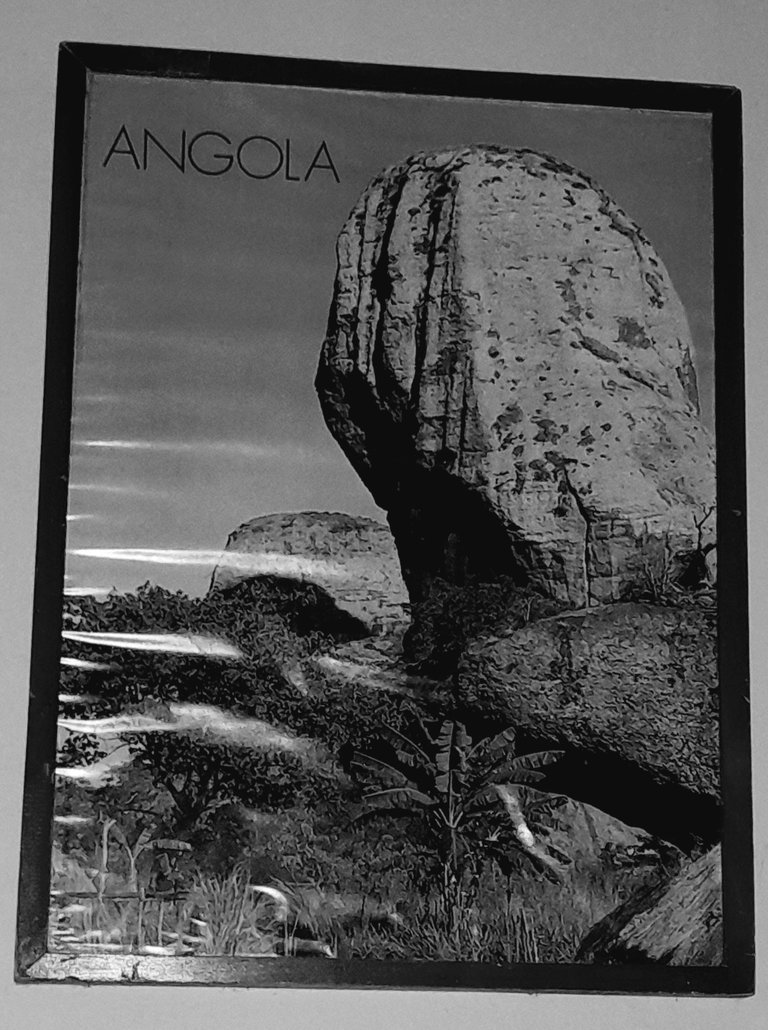Hola amigos de #hiveargentina, soy cubano y me decidi a dejar mi post por acá para participar en la iniciativa de esta comunidad #Africa en #America latina. Argentina es un país hermoso, también con influencia africana, imagino muchos de ustedes hablen sobre ello aquí, pero hoy quiero contarles específicamente de la influencia del continente africano sobre Cuba y especialmente sobre Santiago, mi ciudad.

La cultura africana ha dejado una huella indeleble en la identidad cultural de Cuba, particularmente en Santiago de Cuba, donde las tradiciones y costumbres africanas se entrelazan con las influencias indígenas y españolas. Este sincretismo cultural ha dado lugar a una rica diversidad que se manifiesta en la música, la danza, la religión y otras expresiones artísticas.
Uno de los ejemplos más significativos del impacto de la cultura africana en Cuba es la religión de la Santería, que se originó a partir de la fusión de las creencias yorubas traídas por los esclavos africanos con el catolicismo impuesto por los colonizadores españoles. En Santiago de Cuba, la Santería no solo es una práctica religiosa, sino también un elemento central en la vida social y cultural de la comunidad.
La religión Yoruba, como también se le conoce rinde homenaje a los Orishas, deidades que representan fuerzas de la naturaleza y aspectos de la vida humana. Cada Orisha tiene su propio conjunto de rituales, canciones y danzas, que son fundamentales para las ceremonias que se les hacen cada año, un día específico para cada uno; por ejemplo, el Orisha Changó, asociado con el trueno y el fuego, es uno de los más venerados y su celebración incluye música vibrante, tambores batá y danzas enérgicas que reflejan su poder y majestuosidad. Durante las festividades en honor a Changó, los santeros y santeras se visten con colores rojo y blanco, simbolizando su conexión con este Orisha. Otros Orichas son Yemayá, reina del mar simbolizada con el color azul, Oshun reina de la miel y el agua dulce , simbolizada con el amarillo, Obbatala con el blanco y Babalu Aye con el morado, solo por mencionar algunos más.
La influencia africana también se manifiesta en la música cubana, especialmente en géneros como el son, la rumba y el mambo. Estilos que incorporan ritmos africanos que han sido adaptados y fusionados con elementos europeos, creando un sonido único que es reconocible a nivel mundial. La rumba tiene sus raíces en las tradiciones africanas de los pueblos bantúes y es un claro reflejo de esta herencia cultural. En Santiago de Cuba, las manifestaciones rumberas son comunes en festivales y celebraciones populares, donde se pueden ver grupos de músicos y bailarines que mantienen viva esta tradición.

La cultura africana ha sido fundamental en la conformación de la identidad cubana, especialmente en Santiago de Cuba. A través de la Santería y las diversas expresiones musicales y dancísticas, esta influencia se sigue celebrando y preservando, destacando la riqueza del patrimonio cultural que resulta del encuentro entre diferentes tradiciones. La continuidad de estas prácticas es un testimonio del legado africano en la isla y su capacidad para adaptarse y florecer en un nuevo contexto.
Invito a mis amigas @rivereyesmusic y @daniverdecia a participar en este concurso.
Las fotos son de mi propiedad
Hello friends of #hiveargentina, I am Cuban and I decided to leave my post here to participate in the initiative of this community #Africa in Latin #America. Argentina is a beautiful country, also with African influence, I imagine many of you talk about it here, but today I want to tell you specifically about the influence of the African continent on Cuba and especially on Santiago, my city.

African culture has left an indelible mark on the cultural identity of Cuba, particularly in Santiago de Cuba, where African traditions and customs are intertwined with indigenous and Spanish influences. This cultural syncretism has given rise to a rich diversity that manifests itself in music, dance, religion and other artistic expressions.
One of the most significant examples of the impact of African culture in Cuba is the religion of Santeria, which originated from the fusion of Yoruba beliefs brought by African slaves with the Catholicism imposed by the Spanish colonizers. In Santiago de Cuba, Santeria is not only a religious practice, but also a central element in the social and cultural life of the community.
The Yoruba religion, as it is also known, pays homage to the Orishas, deities that represent forces of nature and aspects of human life. Each Orisha has its own set of rituals, songs and dances, which are central to the ceremonies held for them each year, on a specific day for each one; for example, the Orisha Changó, associated with thunder and fire, is one of the most venerated and its celebration includes vibrant music, batá drums and energetic dances that reflect its power and majesty. During the festivities in honor of Changó, the santeros and santeras dress in red and white colors, symbolizing their connection with this Orisha. Other Orichas are Yemayá, queen of the sea symbolized with the color blue, Oshun queen of honey and fresh water, symbolized with yellow, Obbatala with white and Babalu Aye with purple, just to mention a few more.
The African influence is also evident in Cuban music, especially in genres such as son, rumba and mambo. Styles that incorporate African rhythms that have been adapted and fused with European elements, creating a unique sound that is recognizable worldwide. Rumba has its roots in the African traditions of the Bantu peoples and is a clear reflection of this cultural heritage. In Santiago de Cuba, rumba demonstrations are common at festivals and popular celebrations, where you can see groups of musicians and dancers who keep this tradition alive. 
African culture has been fundamental in shaping Cuban identity, especially in Santiago de Cuba. Through Santería and various musical and dance expressions, this influence continues to be celebrated and preserved, highlighting the richness of the cultural heritage that results from the encounter between different traditions. The continuity of these practices is a testament to the African legacy on the island and its ability to adapt and flourish in a new context.
I invite my friends @rivereyesmusic and @daniverdecia to participate in this contest.
Posted Using INLEO
Este post ha sido votado y curado por el equipo Hive Argentina | Participa en nuestro Trail de curación.
Gracias
Realmente la cultura africana está en nuestro gen y muchas veces, ni siquiera, nos damos cuenta. Si indagamos un poco o elevamos la vista, veremos muchas influencias africanas en nuestros pueblos latinoamericanos.
Agradecemos que expongas tus pareceres en esta iniciativa e invitamos a que sigas participando en las iniciativas mensuales de la comunidad.
Feliz día.
Muy cierto. Gracias a la comunidad por permitirme publicar.
Congratulations @drahmed! You have completed the following achievement on the Hive blockchain And have been rewarded with New badge(s)
Your next target is to reach 3500 upvotes.
You can view your badges on your board and compare yourself to others in the Ranking
If you no longer want to receive notifications, reply to this comment with the word
STOPCheck out our last posts:
El aspecto religioso creo que ha sido la influencia más marcada en Cuba, además de la música.
Es fantástico ver como las culturas se han mezclado a lo largo de los años y los resultados de la influencia del continente africano en el resto del mundo.
Si, la religión está marcada por encima de todo, decía un grande de nuestro país que en Cuba "el q no tiene de congo tiene de carabalí"